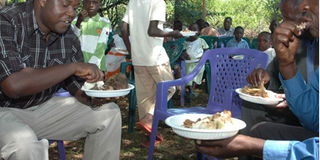
Families feasting during Christmas bash at Sabembe village in Kisumu East. Kenyans can now only afford a frugal Christmas because of high cost of food, fuel, cooking oil, electricity and transport.
In 2023, over 2.6 billion Christians worldwide — expected to rise to around 3.3 billion out of the world’s 9.7 billion people by 2050 — will celebrate the birth of Jesus of Nazareth differently across countries, cultures and civilizations.
Kenya and Singapore, two countries in the Global South but 7,326 km apart, will be celebrating Christmas in significantly different ways. Singaporean Christians, comprising 18.9 per cent of the Island nation’s 5.92 million people, will afford a lavish Christmas.
But their fellow believers in Kenya, an estimated 85.5 per cent of the Country’s 55.61 million people, will only afford a Spartan Christmas — or none at all.
The difference lies in the values the power elites of the two countries have elevated to drive their politics and the economy.
Singapore eschewed a political system driven by ideology, dogmatism, religious bigotry, populism and parochial nationalisms. Its founding father, Lee Kuan Yew, once quipped that he was not “enamoured with ideology” but instead with what works.
It anchored its political system on the ‘holy’ trinity of integrity, meritocracy and pragmatism. Today, with an annual growth rate of 7.6 per cent and a Gross Domestic Product per capita of US$72,794, Singapore can afford a perfect merry Christmas.
Under the political system in the Judaea province of the Roman Empire in the first century, the birth of Jesus could not be perfect.
Ancient Judea was an overtaxed, impoverished and coerced society. While 10 per cent of its inhabitants, mainly the Roman imperial aristocracy, the Herodian client kings and the priesthood, was born into nobility and lived lavishly, 90 per cent of the people were peasants working the fields around Nazareth or herding animals in the more drier Bethlehem.
Taxation is at the core of the nativity story. Rome’s Herodian rulers pocketed tax revenues and lived a decadent lifestyle.
To streamline tax-collection, Gaius Julius Caesar Augustus (62 BC to AD 14), the founder of the Roman Empire ordered that all Roman subjects be counted in their homes. The parents of Jesus, Joseph and Mary, travelled to Bethlehem to register as taxpayers (Luke 2:1-3).
However, heavy taxes, poverty and brutality fuelled Jewish nationalism. Ideologically, protest in Judea pivoted around the ancient prophecies about a liberator (‘messiah’). Baby Jesus appears as a nationalistic hero. Jesus came from the loyal bloodline of King David and Father Abraham (Luke 1:33-34).
However, the idea that the infant was the true “king of the Jews” alarmed the Herodian rulers of Judea. Even more alarming was the visit by the wise men (Magi) to gift and worship the new-born King (Matthew 2:11-12).
Known for killing subjects on suspicion of plotting against him, Herod ordered the execution of all male children in the vicinity of Bethlehem who were two years and below (Matthew, 2:16–18).
Joseph and Mary fled with their baby to exile in Egypt where they lived until Herod’s death, then moved to Nazareth in Galilee to avoid living under Herod’s son Archelaus. The story of Christmas ends with Jesus’ return to Judea to launch his campaign for a just ‘Kingdom of God’.
There are reasons galore why Kenyans will have an austere Christmas. Today, Kenya is ranked as a lower-middle-income economy. But ideology — populist policies, religious bigotry and parochial nationalisms — has stridently replaced civic nationalism and the values of pragmatism, integrity and meritocracy. It is ranked 123 out of 180 least corrupt nations.
Kenyans can only afford a frugal Christmas because of high cost of food, fuel, cooking oil, electricity and transport.
Kenyans spend about 45 per cent of their income on food. With the shilling on a free-fall against the US Dollar, Kenyans will pay more for imported favorite ingredients of Christmas meals like wheat, rice and vegetable oils.
The country’s poorest people may not afford chicken, chapati or roasted goat meat identified with Christmas. Although the price of Brent crude has declined over November-December hiatus, Kenya’s prices of petroleum products are the highest in the region.
Mobility is a luxury many can hardly afford. Hustlers in urban areas will not travel to join their kith and kin over the festive season. As poverty deepens, the middle-class (those earning between Sh24,000 and Sh120,000 monthly) has shrunk and swelled the ranks of the ‘hustlers.’ Only three per cent of Kenyans earn an income above Sh50,000 a month.
Future Christmas festivals might be merrier for Kenyans if its power elite takes to heart lessons from Singapore in value-based, pragmatic and meritocratic management of public affairs. First, Singapore’s leadership chose pragmatism over ideology and dogmatism. Second, they gave a pride of place to meritocracy, putting their best brains and talent in critical public offices. Third, Singapore has put in place one of the world’s most effective, anti-corruption architecture.
As a result, Singapore ranked 180 out of 180 countries in perceived levels of public sector corruption. Finally, Singapore’s leaders eschewed populist policies like plague, instead pursuing long-term social and economic planning and championing civic nationalism as the principles to manage diversity and to govern a divided society. As a result, the Island country is a model of a secular state and a “melting pot” of various religious practices. As a result, Singapore has built one of the most stable economies in the world, with no foreign debt, high government revenue and a consistently positive surplus. It has lifted many families up from poverty, enabling them to have a merry Christmas. In 2023, I can only wish Kenyans a Merry Spartan Christmas!
- Professor Peter Kagwanja former Government Adviser (2007-2013), and currently Chief Executive at the Africa Institute (API), Adjunct Professor at the University of Nairobi and visiting scholar at the National Defence University—Kenya (NDU).







